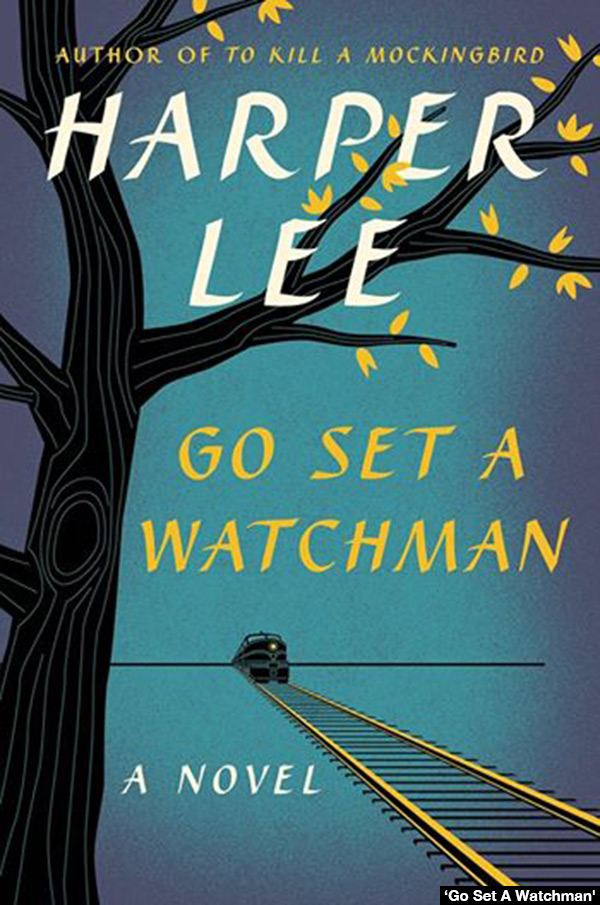
From the publisher:
Maycomb, Alabama. Twenty-six-year-old Jean Louise Finch– “Scout”– returns home from New York City to visit her aging father, Atticus. Set against the backdrop of the civil rights tensions and political turmoil that were transforming the South, Jean Louise’s homecoming turns bittersweet when she learns the disturbing truths about her close-knit family, the town, and the people dearest to her. Memories from her childhood flood back, and her values and assumptions are thrown into doubt. Featuring many of the iconic characters from To Kill a Mockingbird, Go Set a Watchman perfectly captures a young woman, and a world, in a painful yet necessary transition of the illusions of the past– a journey that can only be guided by one’s own conscience.
Written in the mid-1950s, Go Set a Watchman imparts a fuller, richer understanding and appreciation of Harper Lee. Here is an unforgettable novel of wisdom, humanity, passion, humour, and effortless precision– a profoundly affecting work of art that is both wonderfully evocative of another era and relevant to our own times. It not only confirms the enduring brilliance of To Kill a Mockingbird, but also serves as its essential companion, adding depth, context, and new meaning to an American classic.
This review contains spoilers regarding Go Set a Watchman‘s plot.
HarperCollins attests that Go Set a Watchman “not only confirms the enduring brilliance of To Kill a Mockingbird, but also serves as its essential companion, adding depth, context, and new meaning to an American classic.” This, at least the latter part, may be more true than the publishing house had ever intended: Go Set a Watchman does in fact lend new meaning to Lee’s first novel, but perhaps in a different way than what anyone had ever hoped.
It is evident that Go Set a Watchman was never meant to be published, at least not as a companion to To Kill a Mockingbird: there are several instances of overlapping text, in the first few chapters especially; Go Set a Watchman is written in third person omniscient, whereas To Kill a Mockingbird is written in first; considerable discrepancies between the books’ plots will leave readers disoriented and dejected. This makes sense, if we believe that Go Set a Watchman was actually a first draft of To Kill a Mockingbird, and according to Lee’s first publisher, not a very good one.
As a novel, there is no question that it fails. Its characters are difficult to grasp; its setting and society both flat; its plot tenuous and uncompelling, a sluggish series of events propelled forward only by the context that is the sole reason for its publication. For without To Kill a Mockingbird, Go Set a Watchman would be of no consequence to us– it would be nothing. And it is for precisely this fierce, unflappable love for what used to be Harper Lee’s one and only American classic that we are forced to read on, resolute and flinching.
The truth is that we will never know what Lee intended for Scout Finch and her family: Go Set a Watchman is but a rough daft of their future, hopefully one Lee discarded after having written To Kill a Mockingbird and fully developed the cast of characters it brought to life. As I said, it is clear that the novel was never intended to be published– from this we may glean what we will: ideally, that it reveals philosophies and peripeteia that she later abandoned herself, and that we were never meant to know.
Be that as it may, as I see it, Go Set a Watchman in no way tarnishes the fundamental characteristics that allowed To Kill a Mockingbird to break through to the heart of America, and there to build itself a home. The Pulitzer Prize-winning novel was, is, and shall forever remain the richly-worded rebel that so boldly challenged prejudice and ignorance through one young girl’s voice. To Kill a Mockingbird, easily securing the love of readers of all ages, is what it always was: an outcry against the destruction of innocence, in whatever form it may come, so loud that it is still heard today.
This, this denouncement precisely, is what makes Go Set a Watchman so difficult to comprehend. For around what does its plot revolve, if not the ultimate destruction of Jean Louise Finch’s innocence? For those who thought To Kill a Mockingbird was Scout’s paramount coming of age story, prepare to be jolted. Go Set a Watchman invites readers into the bleak angst-ridden years of Jean Louise’s adolescence, to her cynical but free life in New York, to her stifling return home: “Hell was and would always be as far as she was concerned, a lake of fire exactly the size of Maycomb, Alabama.” (Lee, p.61) Harper Lee now teaches us that the destruction of innocence, although never pretty, is sometimes a necessary evil. Necessary so that the last fragment of the child that was Scout Finch may finally die, and a young woman take her place.
Unfortunately, in order for this to occur, America’s immortalized incarnation of upstanding morals, manners, and Samaritanism, Atticus Finch, so too had to shatter. And so it goes– he who “is a gentleman, in his heart he is a gentleman” (p. 113) imploded in on himself, becoming the very antithesis of what we always believed he stood for: a segregationist, a pessimist, and a coward. As Atticus once reminded us, there should be “Equal rights for all, special privileges for none”– but it appears, as would announce George Orwell, probably with some degree of humour, that some of us were created more equal than others. Was Atticus merely acting the way he was for Scout’s benefit– putting on a show in order to lead to her maturity? Or did his actions in Go Set a Watchman ring true? Even if his intentions were based solely on his daughter’s wellbeing, does that even matter? Whatever his motive was, the outcome was the same. Whatever his motive was, we’ll never really know.
Personally, what I had the most trouble understanding was Go Set a Watchman‘s ending. It always seemed to me that Jean Louise’s censuring of her father’s actions and assertions was all well and good, but empty next to her claim that “Uncle Jack, I don’t especially want to run out and marry a Negro or something.” (p. 270) I firmly believed that this statement fundamentally detracted from Jean Louise’s credibility as an unprejudiced woman and as a desegregationist, that it undermined her argument that the Supreme Court’s decision regarding the Brown v. Board of Education case, although controversial, was inherently right. I discussed this issue at length with a friend, who fortunately provided more insight on the matter. She reminded me of something Scout had thought way back in Go Set a Watchman‘s first chapter: “Love who you will but marry your own kind was dictum amounting to instinct within her.” (p. 9) Regardless of constitutional equality, cultural differences in 1950s Alabama, as well as Jean Louise’s own mindset, ensured that any African American man would not be of her own kind.
I’m not going to provide a rating for this book. Instead I can only say, don’t read it. If you have any love for To Kill a Mockingbird at all, it’s simply not worth the betrayal. I stand by my belief that Go Set a Watchman should never have been published, and can only express profound reproach towards Lee’s attorney. This is my advice: Hold fast to everything To Kill a Mockingbird has ever signified, everything for which Scout Finch and her family have ever stood, and don’t let go. Choose to remember “A memory of the three of them, Atticus, Jem, and her, when things were uncomplicated and people did not lie.” (p. 241)
Comments are welcome.
I’ll keep you posted,

![[Twitter]](http://www.whatyareading.com/wp-content/plugins/bookmarkify/twitter.png)
